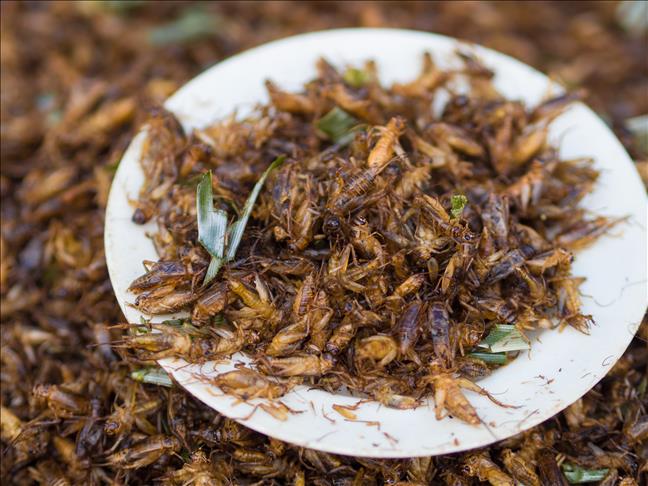
By Magdalene Mukami
BONDO
For most people, the chirping of crickets might be somewhat annoying. Others, however, enjoy being lulled to sleep – as nature intended – by the tiny critters.
But in Bondo, the largest town of Kenya's Siaya County in Nyanza province, crickets have become a delicacy.
"You can eat these ones as snacks," Mary Ratemo, a cricket breeder, told Anadolu Agency as she dipped her hand in a small bag of dried and salted crickets and tossed some into her mouth.
Ratemo, a mother of two, is one of the lucky farmers to have been trained to rear crickets by the Jaramogi Oginga Odinga University of Science and Technology.
A small portion of her farm – where she keeps four cows and over a dozen chickens, with most of the remaining land occupied by maize – is now dedicated to cricket raising.
On entering the part of the farm reserved for crickets, we were greeted by the distinct sound of thousands of crickets chirping, completely muffling the creaking sound made by the wooden barn door.
"Most people say crickets are noisy," said Ratemo with a chuckle. "They never really do shut up."
Ratemo said rearing crickets brought multiple benefits.
"It is a source of food for our family, and, secondly, it is a source of income," she explained. "With the income, we are able to do other things, like take our kids to school and buy clothes for them."
The Jaramogi Oginga Odinga University of Science and Technology has trained over 500 farmers how to raise crickets for food.
Ratemo says raising crickets is cheap.
A farmer needs only $10 for their first batch of crickets, which can eventually fetch them up to $75.
-Alternative proteins-
Ratemo believes the insects also provide protein at an affordable price.
"Normal sources of protein, like fish and beef, are very expensive nowadays," she told AA.
According to a 2013 report by the World Food Program, food prices in Kenya rose by 10.4 percent in that year, pushing inflation up by 7.2 percent.
The rising prices have been blamed on short-sighted agricultural policies, corruption, inadequate rainfall and food insecurity.
"As a woman, I would advise other women to go for crickets because it is a cheaper source [of protein] and is also readily available," said Ratemo.
"It [Crickets] can be pan-fried and eaten with ugali [a Kenyan staple food] and some vegetables," explained the mother of two.
"You can grind crickets into a powder and use it as an ingredient to make other foods, like cookies, cakes and biscuits," she added.
"A woman like me, I can also prepare pilau [rice with spices] made out of crickets," noted Ratemo. "I can even make samosas, sausages and muffins."
"I can also enrich my chapatti [a type of bread] with crickets, especially for kids who want to carry some snacks to school," she added.
Eating insects in Kenya has always been associated with the disadvantaged – but that perception is changing.
In many areas of Nyanza province, crickets have become a delicacy and are now treated as a special food.
A huge sign outside one hotel invites customers to sample their "Manyangafu-Onjiri," which translates to "Special Crickets."
"With time, researchers have convinced many consumers that you don't have to go to edible insects as a last resort because you don't have anything to eat," Prof. Monica Ayieko, a consumer economist and lecturer at the Jaramogi Oginga Odinga University's center for food security, told AA.
"You eat insects for choice because it is a cuisine, they taste good, they are natura, and they are a very rich source of nutrients," she said.
"Only insects are rich in carbohydrates, protein, minerals and vitamins," the scholar stressed.
"All the trace minerals and vitamins essential for human beings are found in insects. Therefore, more people are turning to edible insects by choice," she added.
-Food security-
Prof. Ayieko believes crickets can be used to combat food insecurity in Kenya.
She has been researching edible insects since 2002, working with different types, including termites, lake flies, grasshoppers and black ants.
"When we made a breakthrough in rearing crickets, we started training farmers," Ayieko told AA.
She believes that, because of the short maturity age of baby crickets ("pinheads"), cricket farming is not only a convenient way to ensure food security, but also a reliable way for farmers to earn a living.
After adult insects (two to three months old) mate, the females lay eggs that hatch after about ten days.
"To save the world from the current food insecurity, we have to turn to crickets and other nutritious insects," the economist insisted. "Edible insects have a future."
According to the 2014 Global Food Security Index, Kenya was ranked 80 out of 109 countries in terms of food security.
Food security experts in Kenya believe this is a wakeup call for the East African nation, which has 41.6 percent of its population currently living under the global poverty line.
According to a recent UN report, it is estimated that by 2050 the global population will surpass the 9.5-billion mark.
For most food security experts, new methods should be devised and put in place if the world is to feed such a massive population.
"If we as researchers continue at the tempo at which we are currently working, we will see more and more people turning to edible insects," said Prof. Ayieko.
"We are talking food security for 9 billion [people] in 2050. Edible insects will feature very prominently, because the world has woken up to this source of food," she added.
Anadolu Agency website contains only a portion of the news stories offered to subscribers in the AA News Broadcasting System (HAS), and in summarized form. Please contact us for subscription options.







